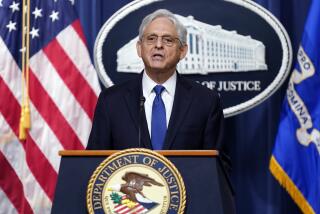Reagan’s Taped Testimony Urged for Poindexter Trial
- Share via
WASHINGTON — The Bush Administration argued Tuesday that former President Ronald Reagan should be permitted to testify on videotape if he must give evidence in the Iran-Contra trial of former National Security Adviser John M. Poindexter.
Although the Justice Department and Reagan’s personal attorney argued that Reagan should be excused entirely, they maintained that a videotape appearance would be preferable to forcing a personal appearance, in part because the tape could be edited if Reagan inadvertently blurted out national secrets.
But Poindexter attorney Frederick Robinson called the videotape plan a “blatantly inadequate” substitute for a defendant’s right to call witnesses of his own choosing. Poindexter is scheduled to go on trial next month on five criminal charges resulting from the Iran-Contra affair.
U.S. District Court Judge Harold H. Greene said he would rule later on the issue.
Meanwhile, Greene told Poindexter’s lawyers to submit the specific questions they would like to put to the former President. Greene said that a list of 67 subjects which defense attorneys gave him earlier was “far too opaque” to permit him to decide if the questioning was necessary to Poindexter’s defense.
During a hearing of almost two hours, Robinson argued that Reagan was the only person who could corroborate Poindexter’s version of what transpired when Reagan and Poindexter met during the months before the Iran-Contra affair began to unravel.
But Asst. Atty. Gen. Douglas Letter and Reagan’s lawyer, Theodore B. Olson, said presidents have a right to maintain the confidentiality of private conversations, particularly those that concern national security or relations with foreign nations. They noted that no President or former President has ever been compelled to testify over his objections.
Robinson said the U.S. Supreme Court ruled in 1807 that a President can be called into court when Aaron Burr, on trial for treason, sought the testimony of President Thomas Jefferson. He said the ruling was applied to President Richard M. Nixon during the cases that resulted from the Watergate scandal in the 1970s. Despite the rulings, however, something always intervened to prevent a President from actually appearing in court against his will.
“Lots of people have said that (a President may be compelled to testify), but nobody has ever done it,” Greene reminded Robinson.
“That is correct, your honor,” Robinson replied. “It only means that you will have the opportunity to do it first.”
Greene told Poindexter’s lawyers to prepare their specific questions by Thursday. He said that if he decides to order Reagan to testify, either in person or on videotape, defense attorneys would be permitted to ask follow-up questions not on the list but would not be allowed to introduce new subjects.
More to Read
Get the L.A. Times Politics newsletter
Deeply reported insights into legislation, politics and policy from Sacramento, Washington and beyond. In your inbox twice per week.
You may occasionally receive promotional content from the Los Angeles Times.









